Are Golden Retrievers aggressive? It’s a question that often sparks curiosity among dog lovers. Golden Retrievers, known for their kind and gentle nature, are charming dogs and beloved family pets. But just like any breed, including rescue dogs, they can exhibit aggression in certain situations. Understanding the factors behind this behavior is crucial for all dog breeds.
Aggression in Golden Retrievers, or goldens, may arise when these charming dogs feel their territory is threatened or encounter new people or unfamiliar situations. While these incidents are not familiar to rescue dogs, it’s essential to be aware of them to ensure the well-being of your puppies and those around them.

By gaining insights into their behavior through behavioral training and learning practical strategies to address dog aggression and biting, you can create a harmonious environment where your charming dogs can thrive without harming others.
So, let’s explore the fascinating world of Golden Retrievers and uncover how we can foster a safe and friendly atmosphere for all goldens, including puppies. It’s essential to address any issues with dog aggression and ensure a harmonious environment for your goldie.
Table of Contents
- 1 Potential for Aggression in Golden Retrievers
- 2 Recognizing Signs of Aggression in Golden Retrievers
- 3 Factors Influencing Aggressive Behavior in Golden Retrievers
- 4 Effective Strategies for Managing Aggression in Golden Retrievers
- 5 Importance of Socialization and Training in Preventing Aggression
- 6 Conclusion
- 7 Related posts:
- 8 Why Does My Golden Retriever Attack Other Dogs: Reasons and Solutions
- 9 Golden Retriever Aggressive Behavior - Stop the Destruction
- 10 Golden Retriever Puppies (25 Cute Goldies)
- 11 Are Golden Retrievers Protective?
Potential for Aggression in Golden Retrievers
Golden Retrievers, also known as golden or goldies, are not inherently aggressive. However, it is essential to understand the factors that can contribute to dog biting incidents, especially for puppies. We can better prevent attacks by identifying potential triggers for aggression in Golden Retrievers.
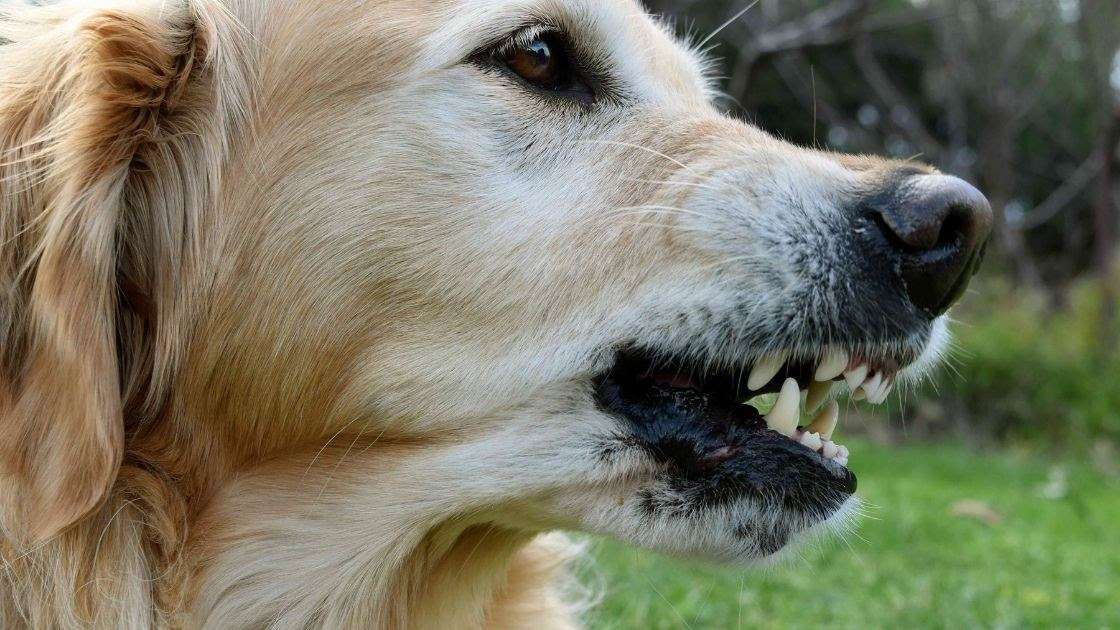
- Genetic predisposition and breeding practices: Some Golden Retrievers, also known as Golden, may have a genetic predisposition towards aggression. Irresponsible breeding practices can also increase the likelihood of aggressive behavior in certain bloodlines, including goldie puppies.
- Lack of socialization and inadequate training: Proper socialization from an early age is crucial for Golden Retrievers puppies to develop good behavior and temperament. They may become fearful or anxious without adequate socialization, leading to defensive aggression. Similarly, insufficient training can result in a lack of discipline and control for goldens, which may manifest as aggressive tendencies in dogs.
- Environmental factors: The environment in which a Golden Retriever puppy grows up plays a significant role in their behavior. Negative experiences or trauma can trigger fear-based aggression in dogs. If a goldie has been exposed to violence or harsh treatment, it may learn aggressive behaviors such as self-defense.
It’s important to note that while some Golden Retrievers may exhibit signs of aggression, it does not mean that all puppies or dogs of the breed are aggressive. Most Golden Retrievers, including Goldie, become friendly and gentle companions with proper care, training, and socialization.
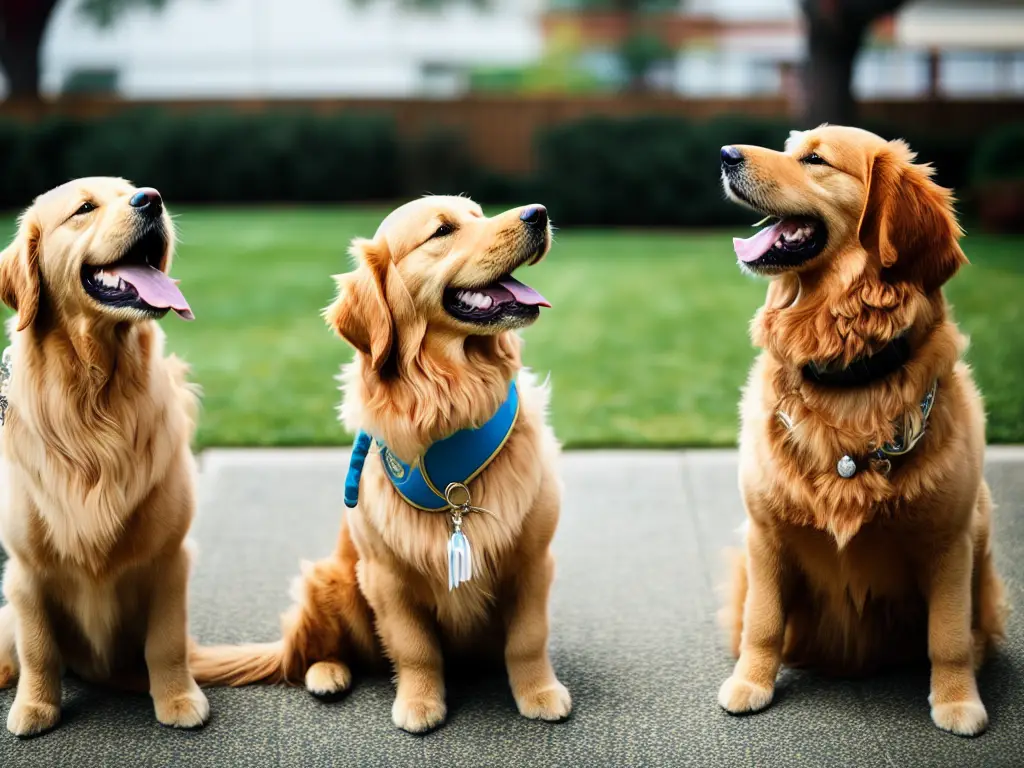
If you notice any signs of aggression in your Golden Retriever puppies or adult dogs, promptly addressing the issue with professional guidance is essential. Early intervention and appropriate training techniques can help manage and modify aggressive biting behaviors effectively.
Remember that each puppy is an individual with unique needs and personalities. Understanding the potential for aggression in Golden Retrievers allows owners to support and create a safe environment for their furry friends, including puppies and dogs named Goldie.
Recognizing Signs of Aggression in Golden Retrievers
Identifying signs of aggression in golden retriever puppies is crucial for early intervention and prevention. As responsible dog owners, we must know the warning signs that may indicate aggressive behavior in our beloved goldie puppies. By recognizing these signs, we can promptly address the issue and seek professional help to ensure the well-being of our dogs.
Here are some key indicators to watch out for:
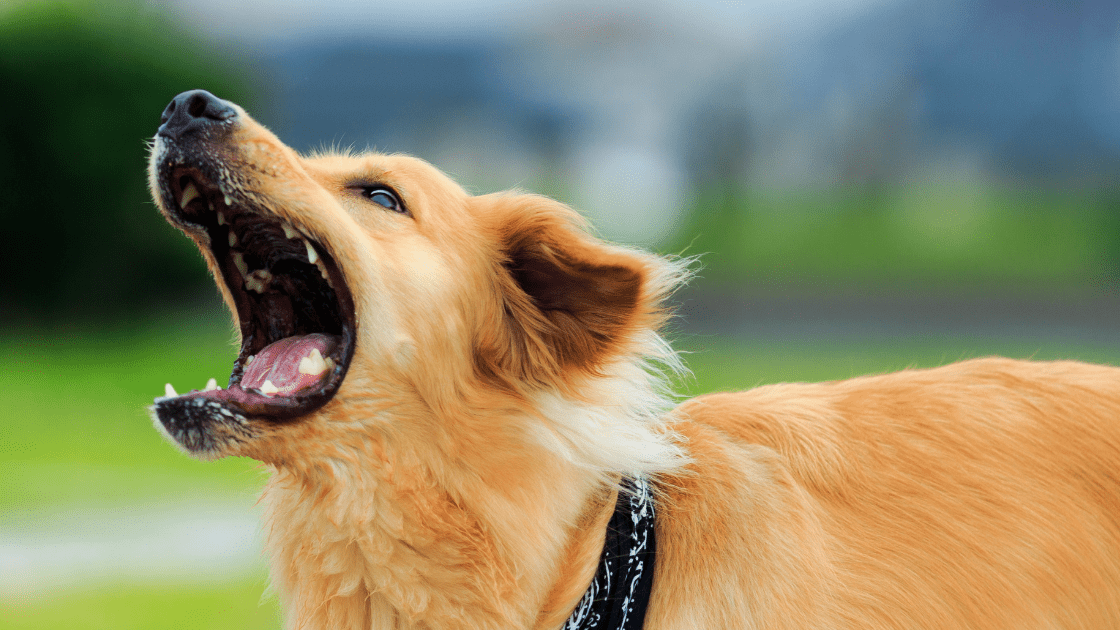
- Growling, snarling, or baring teeth indicate that your goldie might feel threatened or behave aggressively
- Raised hackles and intense staring: When a golden retriever’s hackles are increased, and they engage in intense staring, it could signal potential aggression towards people or other animals.
- Lunging towards people or other animals: If your dog starts lunging aggressively towards others, it’s essential not to ignore this behaviour as it can escalate quickly.
Recognizing signs of dog aggression in dogs, especially in a puppy or an aggressive golden retriever, allows us to take appropriate action. Here’s what you can do.
- Address the issue promptly: Don’t brush off any warning signs as just “bad behaviour.” Take them seriously and intervene early on.
- Consult a professional: Seeking guidance from a certified dog trainer or animal behaviorist can provide valuable insights into managing aggression in your golden Retriever.
- Create a safe environment: Minimize triggers that may cause your dog to exhibit aggressive tendencies. This includes avoiding loud noises or situations that make them uncomfortable.
- Socialize your puppy: Early socialization plays a vital role in preventing aggression later on. Exposing your golden retriever puppy to various people, animals, and environments helps them become well-adjusted adults.
- Consider rescue dogs’ backgrounds: If you’ve adopted a golden rescue retriever, be mindful of their past experiences, which may contribute to aggressive behaviors. Patience, understanding, and consistent training are key.
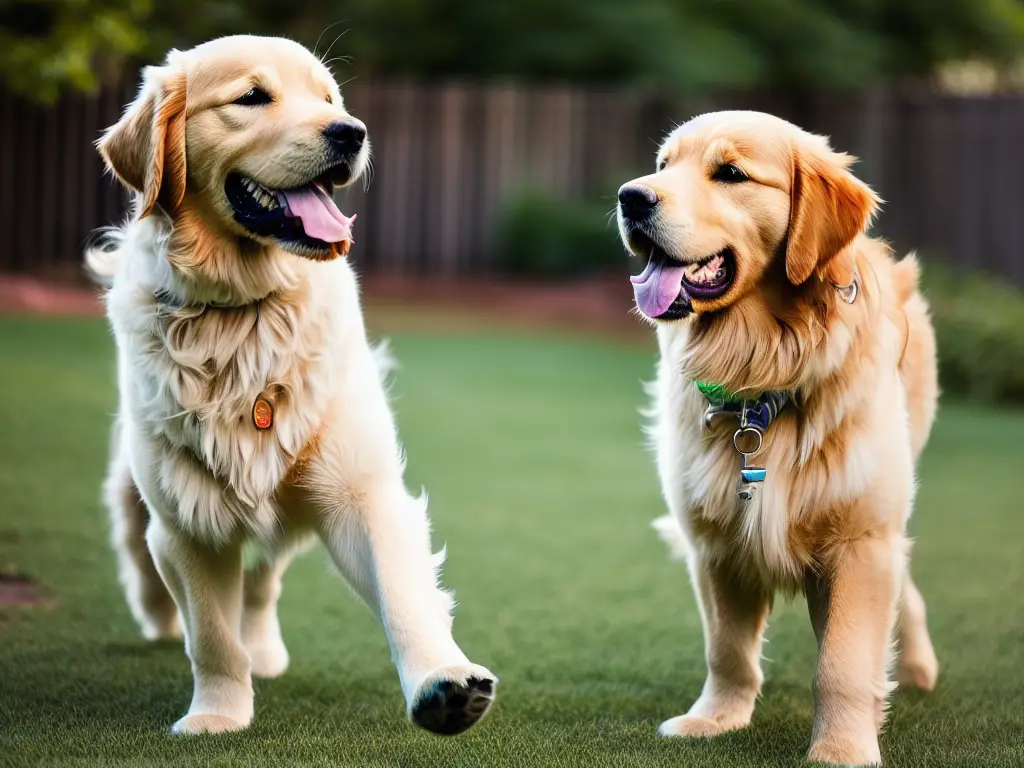
By being attentive to the warning signs and taking appropriate measures, we can ensure a safe and harmonious environment for our golden retrievers and those around them. Remember, aggression in dogs is not exclusive to any specific breed or gender. Our dog owners are responsible for providing proper care, training, and love to help our furry friends lead happy lives.
Factors Influencing Aggressive Behavior in Golden Retrievers
Genetic and environmental factors can influence aggressive behavior in dogs, including Golden Retrievers. Poor breeding practices prioritizing appearance over temperament may increase the likelihood of dog aggression. Traumatic experiences or a lack of positive social interactions during puppyhood can also contribute to later aggressiveness in dogs. Understanding these factors helps develop effective strategies for managing and preventing dog aggression.
Genetics plays a significant role in determining a dog’s behavior, including aggressive behaviors in dogs. Certain genetic traits, such as solid prey drive or territorial instincts, may predispose Golden Retrievers to aggression in dogs. If aggressive tendencies are present in the bloodline, they can be passed down from one generation to another in dogs.
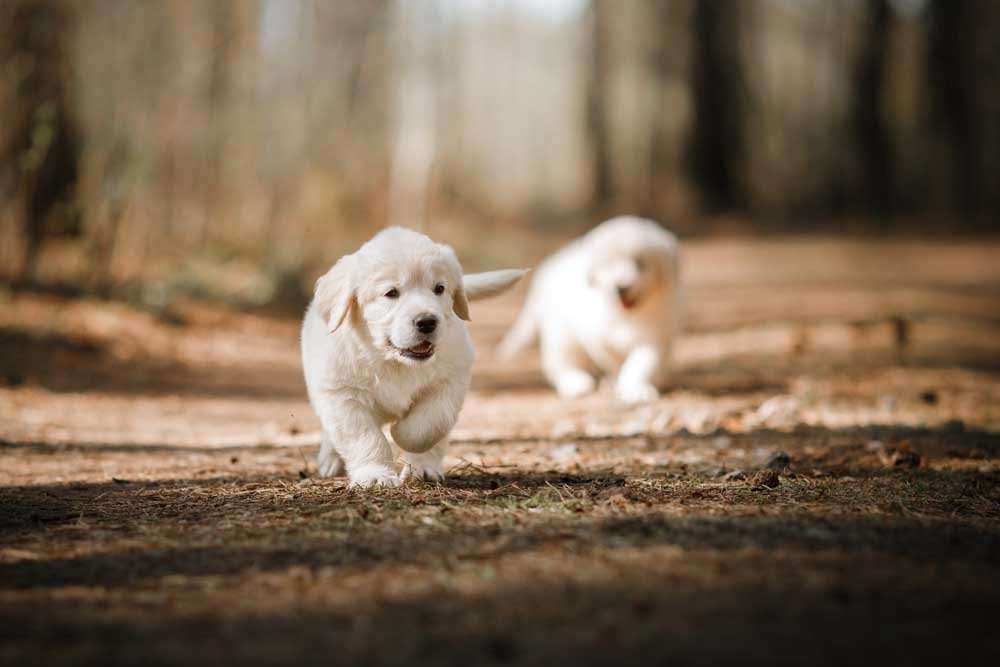
However, it is essential to note that genetics alone do not determine a dog’s behavior. Environmental factors also play a crucial role. Dogs exposed to abusive or neglectful environments are likelier to exhibit aggressive behavior. Similarly, dogs not adequately socialized during their early development stages may struggle with fear-based aggression or react aggressively toward unfamiliar situations.
To address aggressive behavior in Golden Retrievers, it is essential to consider genetic and environmental factors contributing to dog aggression.
- Breeding practices: Responsible breeders prioritize temperament alongside physical characteristics when selecting golden retriever dog breeding pairs to prevent golden retriever aggression in dogs.
- Socialization: Ensuring positive interactions with other dogs, animals, and humans during puppyhood helps build confidence and reduces the likelihood of fear-based aggression.
- Training and obedience: Consistent training using positive reinforcement techniques can help redirect golden retriever aggression and establish clear boundaries for dogs, specifically the golden retriever dog.
- Professional guidance: Seeking assistance from professional trainers or animal behaviorists can provide valuable insights into managing and modifying golden retriever aggression in dogs.
- Providing a safe environment: Creating an environment free from triggers that may provoke aggression is crucial for the dog’s well-being and those around them.
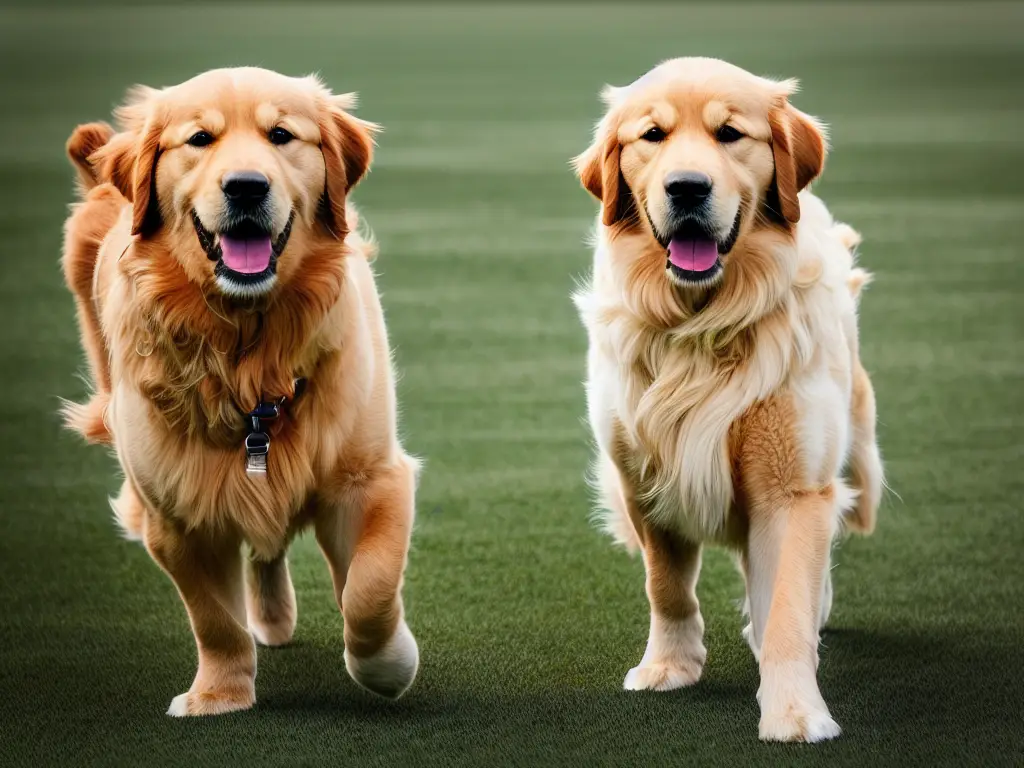
By considering these factors, dog owners can better understand why their Golden Retriever may exhibit aggressive behavior and implement appropriate strategies to address and prevent it.
Effective Strategies for Managing Aggression in Golden Retrievers
Consistent obedience training with positive reinforcement techniques is essential for managing dog aggression. You can encourage good behavior and discourage aggressive tendencies in your dog using treats and rewards. Teach your golden retriever basic commands such as “sit,” “stay,” and “leave it.” This will establish a clear hierarchy and help them understand what is expected of them as a dog.
Providing mental stimulation through interactive toys or puzzles can redirect their energy away from aggressive behaviours. Golden retrievers are intelligent dogs that thrive on mental challenges. Engage their minds by offering puzzle toys filled with treats or hiding toys around the house for them to find. This not only keeps them occupied but also helps prevent boredom-induced aggression.

Maintaining a calm environment at home reduces stress levels which may trigger aggressive responses from your dog. Avoid loud noises, chaotic situations, or sudden changes in routine that could make your golden Retriever anxious or fearful. Create a safe space for them where they can relax and feel secure.
Seeking guidance from a professional dog trainer or behaviourist can provide valuable insights and tailored strategies for managing aggression. These experts have experience working with various breeds, including golden retrievers, and can assess your dog’s needs. They will develop customized training methods to address any underlying issues causing aggression.
Remember that every dog is unique, so using methods that work best for your golden Retriever is essential. Be patient, consistent, and understanding throughout managing their aggression. With proper training, mental stimulation, a calm environment, and expert guidance if needed, you can help your golden Retriever overcome aggressive tendencies and foster a peaceful relationship between you both.
Importance of Socialization and Training in Preventing Aggression
Early socialization is crucial to prevent aggressive behavior in Golden Retrievers. Exposing dogs to various people, animals, and environments during critical development help them become well-adjusted adults.
Positive reinforcement training methods for dogs promote good behavior and discourage aggressive tendencies. Dog owners can effectively shape their Golden Retriever’s conduct by rewarding desired actions and behaviors.

Consistent training and socialization are crucial for a well-behaved and non-aggressive dog like the Golden Retriever. Regular obedience training sessions establish boundaries and teach essential commands for your furry companion.
Proper socialization allows dogs to learn how to interact with other dogs, animals, and people without aggression or fear. It helps them develop confidence in different situations.
Training should focus on preventing frustration and aggression by teaching dogs how to cope with challenging circumstances without resorting to aggressive behavior. This can be achieved through desensitization exercises that gradually expose the dog to triggering stimuli.
Owners of golden retriever dogs should avoid using punishment, as it can lead to fear or anxiety-based aggression. Instead, positive reinforcement techniques such as treats, praise, and playtime should be used to reward good behavior.
If an owner encounters difficulties in training or suspects underlying behavioural issues, seeking professional help is advisable. A professional trainer or animal behaviorist can provide guidance tailored specifically to the individual dog’s needs.
Neglecting proper socialization and training during a dog’s young age can increase the risk of developing aggressive behaviours later in life. Early intervention is critical to preventing these issues from escalating.
Conclusion
In conclusion, while aggression can be a concern in some Golden Retrievers, it is essential to note that not all dog individuals of this breed exhibit aggressive behavior. Understanding the potential for aggression and recognizing the signs are crucial to managing and preventing such dog behavior.
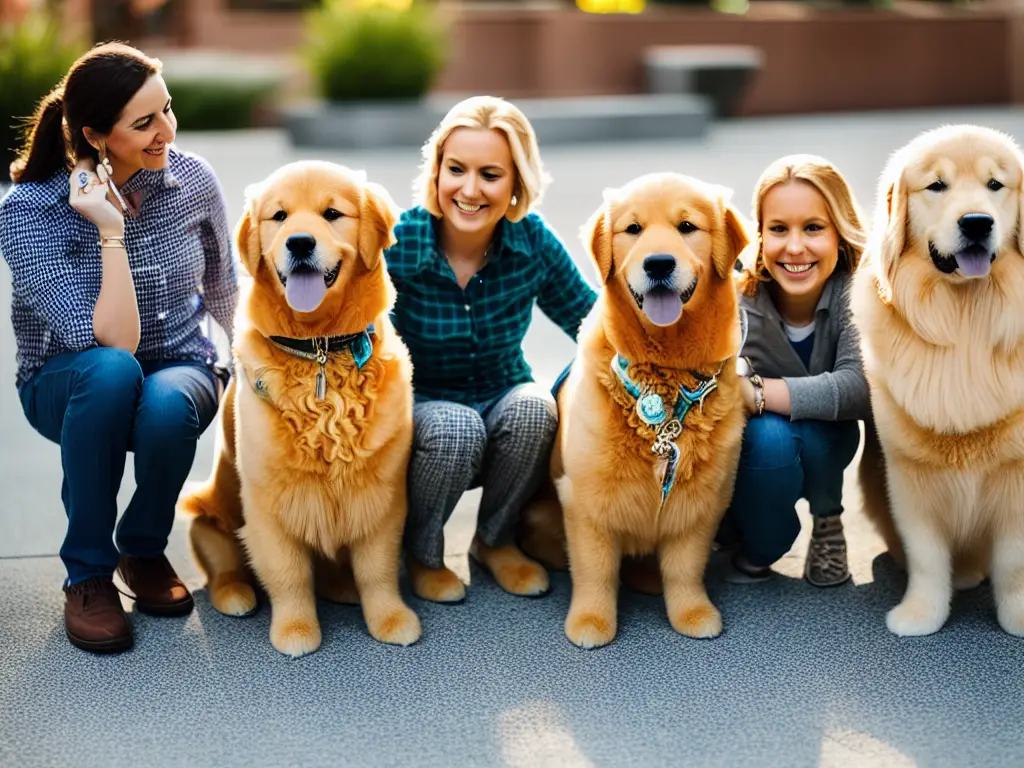
Factors influencing aggression in Golden Retrievers, including genetics, environment, and socialization, can affect their behavior. By addressing these factors and implementing effective strategies for managing aggression, such as positive reinforcement training and providing appropriate outlets for energy, dog owners can help their Golden Retrievers lead happy and well-adjusted lives.
Socialization and training are crucial for preventing dog aggression. Exposing Golden Retrievers to different people, animals, and environments early on helps them develop proper social skills and reduces the likelihood of aggressive tendencies. Consistent training reinforces positive dog behaviors and establishes clear boundaries.
To ensure the well-being of your dog, specifically your Golden Retriever, it is essential to prioritize their socialization needs and invest time in their training. Seek guidance from professional trainers or behaviorists to address any specific concerns or challenges you may encounter with your dog.
Every dog is unique, so patience and understanding are essential when dealing with behavioral issues. You can help your Golden Retriever become a loving companion without aggressive tendencies with proper care, attention, and responsible ownership practices.